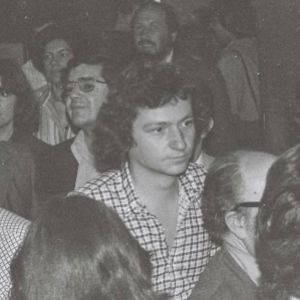I had an advertising agency, but at that time, I was the creative director of that agency along with another partner. Then a friend came and invited me to see some studies that had been conducted and advised by Americans, I don’t know who they were, who came to teach the technique of focus groups to Chile. So they invited several advertisers to take a look, right? Because it had already been decreed that we could have 15 minutes of television. So I went to this and it was quite interesting. After that, all the advertisers who had attended were invited to participate in a creative committee to see what we would do, what the campaign would be, what the strategy would be. So five of us went to some cabins near the beach to come up with this, right? That’s where the campaign strategy came out, which was that on one hand, it was a positive campaign that did not seek to reproach Pinochet for his crimes, but on the contrary, it was a proposal that was for all Chileans, not just for the opposition, giving it an ethics and an aesthetic to the position and how it was being presented, what it was fundamentally offering. And from there came the slogan “Chile. Happiness is coming.” Several scripts were developed, which were later used in the campaign. And above all, the campaign strategy. There was another proposal that was much harsher, reproaching the crimes and showing the suffering that this country had experienced for 15 years. And to us, it seemed like that was insisting on the same, on the same game. Right? A game of opposition, of confrontation, and therefore it promised nothing new, but rather that we would continue in this. And what was expected after a campaign of that kind was that there would be revenge or a retaliation, and therefore we would continue in a country under a black cloud, essentially. We left there, and I entrusted my partner at that time to create the logo. It had a difficulty because “no” is a word that denies everything, right? So “happiness is coming, no” was like a negation. That’s where the image of the cloud dissipating appeared, and after the storm comes the rainbow, so the rainbow was created. It also had a second interpretation that there were people of all colors behind this proposal. And that’s how we presented that campaign proposal. I traveled, went to Europe for a while, and there the campaign was presented to the “No” command. Some people found it to be very lightweight, etc. But eventually, they were convinced, and we were able to create the campaign as it turned out.
There were three directors there. I mean, all of this was very interesting because the majority of advertisers in Chile or people who worked in filmmaking or audiovisuals were individuals who had entered or were in university when the coup happened, and many humanities programs were closed. So, people who came from the world of humanities, intellect, academia, worked in advertising to make a living. A very diverse group, but also very cultured and sensitive, came together. They started working for the campaign free of charge. So, we were fortunate to have the best filmmakers and creatives working for us. The other side, the “Yes” campaign, did not have that. Another decisive element that they didn’t seem to attribute much importance to was that the government had all the media on its side. They had 24 hours a day to convey their message, while we only had 15 minutes. So, they thought no one would watch it, that it didn’t matter. Tremendous mistake, because when you’ve been listening to the same song for fifteen years, suddenly another one appears and everyone wants to hear it. And that’s how it started coming together. We decided to make it like a television program, like a schedule where there was a host, clips, commercials, so to speak, another feature, a report, etc. And there were three directors who were putting together the upcoming programs. So, one was in charge of today’s program, another of tomorrow’s, and another of the following day’s. Around 300 people worked on it, and the most beautiful thing was that the campaign line was understood by everyone, so there was very little to correct because everyone was in agreement. The filmmakers or the people bringing in features did it under the same spirit.
We were a very, very unique campaign because it mobilized a large number of people and did so without major complications. Still, we would debate whether to include a certain feature or not: “this is to hard, we would say, we need to change it.” Well, typical things like that, but it was a work driven by a strong, shared inspiration. And that’s why even today, when we see it, it still moves us emotionally. Thirty years later, it’s still being discussed, perhaps excessively in my opinion, but it continues to shape and mobilize the political agenda. You see, I believe… Well, I’ve been interviewed a lot this week, you know, because of this, and for the past 30 years, a whole generation has existed. And I’ve been trying to find explanations as to why this is happening now because, regardless of it being a round anniversary of 30 years, it could have been 20 or 25 years. This level of intensity had never happened before. And my impression is that there is a great lack of meaning in society in general. This campaign had a lot of meaning, not only political but also the meaning of coming together for a common purpose, and it was an altruistic purpose. Nowadays, there’s no grand common dream. They want to divide society and restrict it, exhaust it, and suppress those who don’t think the same. On the other hand, there’s no clear proposal. They only oppose this. And all of this is happening in an environment of widespread confusion due to the era shift we’re experiencing. And then, this campaign emerges as a great social epic with significant meaning and intense debate and interpretation. But my impression is that it’s like a thirst for meaning, and this campaign had it. So, looking back at history, it appears as a model, as an example. Certainly, it’s irreplicable. Moreover, all the paradigms that sustain this system as it is, are changing. Simply voting for a candidate who represents you is not enough, even if you win, right? Because tomorrow, you might change, your perspective might change, and you might not agree with the person who is governing. So, it’s easier for leaders who seek to fulfill the demand for security. Even if they say outrageous things, during such radical changes as the ones happening now, there is a period of great confusion. No one knows exactly what to do. So, we cling to consumption or saving our jobs or immediate pleasures. And the construction of a society gets left behind because it seems very distant, nearly impossible. There are no leaders proposing any path forward.
Look, we are structured under a system of recording and exchanging information based on the printed word, in a book. And the book is not only a repository of our knowledge but also provides us with a framework for how we should think. So, we think visually, we think by connecting parts to arrive at a sense, like the printed word, and it’s deterministic and concrete. Well, that era ended with the digital age. Today, information circulates in many different ways, and since human beings create value in relationships, we find that by exchanging all kinds of information, even genetic information, for example, today, information is completely disordered. It’s not linear, not sequential, not deterministic, it’s quantum. So, when you enter a quantum process, you don’t know what to do, and there’s no way to know what to do. That’s why these strong leaders exist, they tell you that we don’t have to go back to an orderly, rigid system where the bad guys are locked up and nobody enters our house. Well, that’s going to last for a while, not long. What will happen is that this will continue to impose itself. In other words, when information circulates in this way, all the structures that are based on the concentration of power and control of information, like the Catholic Church, become unsustainable, and the structure changes. And when that structure changes, everything needs to be reinvented. And we still don’t know what it looks like. All the systems we have, including education, with the idea that there’s a teacher who knows more and teaches a group of people who know less… That’s not going to work either.
The same goes for governance with people who have more power and authority because they lack legitimacy and start to crumble, right? They are constantly scrutinized from everywhere. Something happening in Ukraine can have repercussions here. So, it’s a new world. The problem with the printed word is that it’s entirely mental and irrational. Today, it can’t be purely mental and irrational. You have to consider that your whole body is the one reading, your whole body is the one receiving and emitting. And that body has emotions, feelings, intuition, and a connection with the entire universe. And these exchanges of information completely transform you. If you don’t consider that, you’re trying to restrict the world to a very small and limited part, which is our brain, our rationality. In creative committees, at least in what I do or what I have done, when you come up with a concept that doesn’t fit, that doesn’t move you, you discard it. Or you give reasons, the reasons to vote for something, and then the government comes up with other reasons that oppose that idea. So, we tried to search in the Chilean context, in what united us, in what we shared as a culture, for something warm and affectionate. And suddenly, this idea of joy emerged, as something common. We all want to be joyful, we all would like to be joyful, right? We all would like this cloud of violence to dissipate and a rainbow to appear, and that made sense to us, it made emotional sense to us.
But it was through the process of discarding positions that we changed the game. The game changed instead of being one against another, suddenly it was about embracing, it was much more about companionship, much more feminine, right? Less rational. If you look at it clearly, it says strong things, but it does so with humor. Mocking the dictator was a complicated thing at that time. It wasn’t daring, it was very audacious, and today it is done with sentiment. Then you see the dance of the women dancing alone, and that evokes tremendous emotion. No one can oppose a mother’s love or that pure and simple image. That moves everyone. You don’t necessarily have to belong to one party or the other, take one stance or another. I know it’s an emotion that we can all find deep within our hearts. People embracing, people laughing. A woman crying while laughing or smiling. These are images that are incredibly powerful and reach you as a person. Not as a militant. Not as a supporter, not as we saw Mrs. Yolita, who can’t afford to buy tea. And it was also narrated. The entire audiovisual expression was very intimate, it’s all very intimate, intimate, intimate, in order to reach people’s emotions.
And that’s what we felt too. And on the 5th, when the voting came and all this movement of not releasing the results started, I don’t know. Clearly, Pinochet wanted to stage another coup, right? So, it was a moment of great uncertainty and unease. I went to my children’s house, which was nearby, to accompany them and to be there in case anything happened. I was alone, listening to the results on the radio and television, which never came. On the radio, I knew more because the “No” campaign headquarters were providing updates. And well, when it became evident that we had won, I was very moved. I started crying alone there in the living room, in that place. It was a moment when we had managed to defeat this infamous person with our superpower, with our own. And that was very, very, very emotional, very beautiful. And the next day, when we took to the streets to celebrate, you know, people embracing the police officers, I said, “Here we have won, this is the real triumph, right?” Because the people who had been repressed and viewed the police officers as the closest representatives of this all-powerful authority, instead of mocking them or attacking them, embraced them. That was the true triumph of that campaign.


